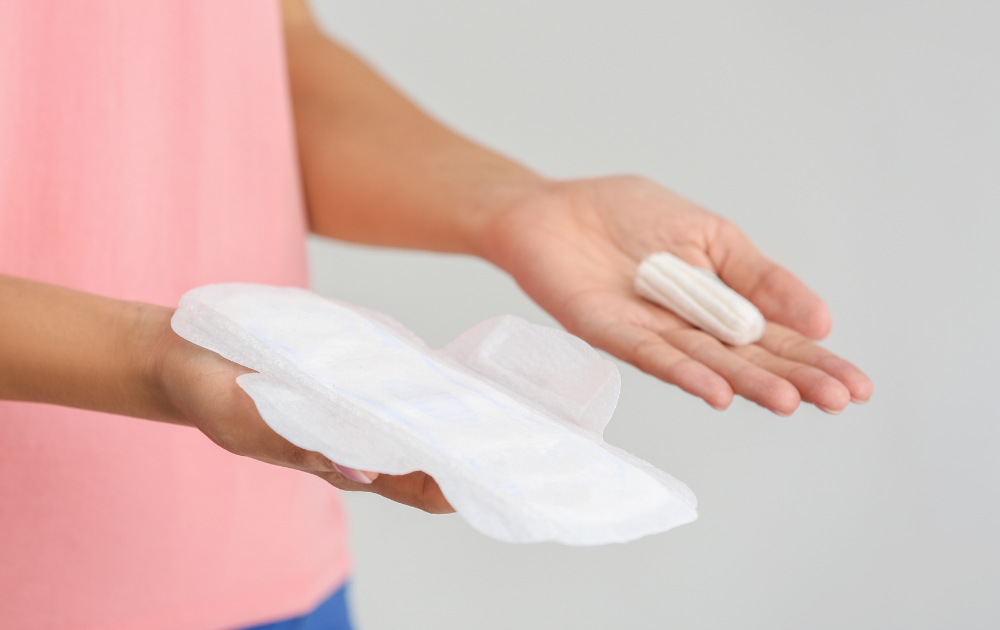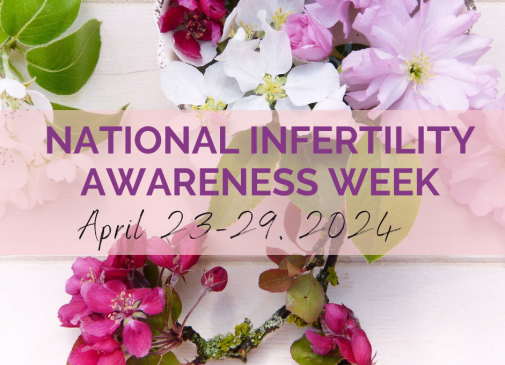
You’re at the grocery store and you zone out staring at the shelves stocked full of period products trying to choose the right out for you. If you regularly deal with a heavy flow, you may be weary of choosing tampons as your “go-to”. Doctors often recommend pads for heavy periods, because they have the ability to hold more blood so you’re not changing feminine hygiene products too often.
It can be exhausting having to run to the restroom every other hour to make sure you haven’t bled through. We understand; navigating the different types and brands can be frustrating. However, it’s crucial you understand that certain menstrual products may come with a slight health risk and how you can help prevent it from happening.
Using Different Sized Tampons
Brightly colored boxes boast different sized tampons from small to ultra absorbent. Some offer a variety of sizes, while others force you to buy a large amount of just one. With so many options on the market, it can be difficult to choose the right one for your flow. You may be wondering if there even is a “right” one. The short answer is, yes. Depending on how heavy or light your period is will determine which size you need.
For example, if you typically have a heavier flow at the beginning and it tapers out over the week, you may want to use a super for the first few days, regular for the next three, and light for the end of your period. However, if you’re looking for tampons for very heavy periods, you may want to stick with the super plus or ultra for the majority of the week.
Variety packs offer you more flexibility if your period is more irregular. The best way to find out what works for you is if it becomes more uncomfortable to insert, go down a size. If you’re changing more frequently than you want (every other hour), than go up a size.
What Is Better for Heavy Periods, Tampons, or Pads?
The long debated topic, “what is better for heavy periods, tampons or pads?” depends on a few different variables:
- Regularity of your period
- Heaviness of your flow
- Activity level
- Schedule
- Other health conditions
For example, if you work all day and don’t want to be inconvenienced by having to change your tampon every few hours, a pad may be the right choice. However, if you are active and don’t want to feel uncomfortable all day, tampons for heavy periods may be what you want to purchase. Make sure to keep extras of both at your disposal so you can adjust to your period’s heaviness.
In the end, it comes down to what you’re most comfortable using. On a budget? Pads may be the cheaper option. If even the small sized tampons hurt when you use them, switch to pads. Are you an active person and don’t want to deal with a pad? Then try tampons to see if they are more convenient. Thankfully, we have a lot more options than our grandparents did. The best part is if you are tired of both, you can try period underwear or menstrual cups. They can be safe alternatives if you want to try something new. Ultimately, it depends on your lifestyle and trying each period product at least once will help you know what works for you.
If you’re having a tough time dealing with a heavy period, you may want to contact a women’s health specialist to discuss possible causes. Give the Fibroid Fighters Foundation a call at 855.455.5262 or contact us online to learn more and locate an expert.
The Health Risks of Using Tampons
Don’t be fooled by friends or family members who say there are lots of health risks of using tampons. Myths surrounding tampon usage have been around for ages. There are some people who say tampons are dangerous; however, if they are used properly the already small risk goes down significantly. Some health risks of using tampons you should be aware of include:
- Bacterial vaginosis
- Yeast infections
- Toxic shock syndrome (TSS)
- Allergic reactions from the tampon material
Many of these issues are linked to how often you change your tampon. During a typical period, tampons should be changed every four to eight hours. This reduces how much bacteria can grow. The health risks of using tampons shouldn’t cause you to avoid using them as long as you know that it is important to change them regularly.
What Is Toxic Shock Syndrome (TSS)?
If you’ve ever looked at the back of a tampon box, you may see the frightening term toxic shock syndrome (TSS). Before you begin hyperventilating, it’s important to understand what it is and how you can easily prevent this rare condition. TSS is a serious health issue caused by a bacterial infection also referred to as staphylococcus aureus. This occurs when bacteria gets into the bloodstream and produces toxins.
Tampons for heavy periods like super, super plus, ultra, etc. have been linked to TSS cases. The longer you leave super absorbent tampons in, the more likely you can get TSS; therefore, it’s crucial to change them regularly and not sleep in them overnight. Tampon risks are relatively low, but using them in the correct way can help lower your risk of TSS.
What Does Toxic Shock Syndrome Feel Like?

Unfortunately, TSS can be difficult to self-diagnose because people tend to experience it differently. However, there are a few common signs and symptoms you should look out for after using feminine hygiene products, especially tampons for very heavy periods; these may include:
- Diarrhea, vomiting, or severe nausea
- Sudden fever
- Low blood pressure
- Aches in your muscles
- Confusion or dizziness
- Unexplained rash
- Redness of eyes, mouth, or throat
- Seizures
If you have experienced any of the above after using tampons, contact your doctor immediately.
The CDC reports that the average rate of TSS is only one case per 100,000 women ages 19 to 44. However, remember to always listen to your body and report symptoms if they should arise. Additionally, it’s important to note that only about half of TSS infections are related to menstruation and feminine hygiene products like tampons for heavy periods. Other ways people develop toxic shock syndrome are:
- Insect bites
- Skin infections
- Open wounds
- Surgical procedures
- Viral infections such as the flu or chickenpox
If you’re worried and wondering what toxic shock syndrome feels like, it is similar to the flu. If you suddenly start feeling flu-like symptoms after leaving a tampon in for an extended amount of time or using super absorbent tampons for heavy periods, don’t hesitate to contact your physician.
Can You Get Toxic Shock Syndrome From Pads?
You may be surprised by this answer, but yes, you can get toxic shock syndrome from pads. Anything can harbor the harmful bacteria that causes TSS. Remember to always change pads regularly to prevent this from happening.
Additionally, you can get toxic shock syndrome from menstrual cups or other feminine hygiene products. Watch out for symptoms and call your doctor even if you’re not sure. Remember, TSS is rare, but you may be at a slightly increased risk if you use super absorbent tampons for heavy periods.
Menstrual Products for a Heavy Period
So, to avoid TSS should you just stop using super absorbent products altogether? No, you don’t have to go to those extremes. Many women opt for super absorbent tampons to control heavy periods. As long as you change them regularly and don’t sleep in them, you will decrease your risk of getting TSS.
Tampons for heavy periods help women live healthier, more active lives. Although, you should be aware of the potential health risks of tampons, so you can watch out for signs or symptoms related to TSS or other vaginal issues. If you’re regularly experiencing a heavy or prolonged period, menstrual cups or period underwear used in conjunction with a tampon might help you get through your day without leaks.
Causes of a Heavy Period
Did you know consistently having a heavy period could indicate an underlying condition? If you’re soaking through feminine hygiene products, bleeding through your clothing, having to change your tampon/pad every few hours, or living with prolonged periods lasting more than 10 days at a time, you may have uterine fibroids. Uterine fibroids are benign tumors located within the uterus or uterine lining that can cause uncomfortable symptoms such as:
- Heavy periods lasting more than 10 days at a time
- Pelvic or abdominal pain
- Severe cramps
- Fatigue caused by anemia
- Protruding belly, similar to pregnancy
- Lower back or leg pain
- Irregular bleeding between cycles
If you are experiencing any of the above symptoms, it’s important to consult a fibroid specialist. Many women think having a heavy period is normal; however, it should not be interrupting your daily life. If you are unable to do the things you enjoy because your period is heavy or long-lasting, it’s important to get to the root of the problem.
Toxic Shock Syndrome Risk for Women with Fibroids
Due to the fact that women with uterine fibroids often endure heavy, prolonged periods, they may be more likely to use super absorbent tampons. Additionally, if their bleeding lasts during the night, they may leave tampons for heavy periods in or change them less frequently. Unfortunately, this makes women with fibroids at an increased risk of developing TSS. Even though TSS is a rare health condition, you should look out for potential indicators. Tampon risks are low; therefore, if you need to use super absorbent products you should. Use them safely by keeping them clean within their wrappers and by changing them every four to eight hours.
Whether you have been diagnosed with uterine fibroids or have noticed a few of the symptoms, it’s crucial to find a fibroid specialist you can trust. The Fibroid Fighters Foundation, is committed to helping women find expert care near their home. If you would like to learn more about fibroids, get checked, or find treatment, give us a call at 855.455.5262 or contact us online.







